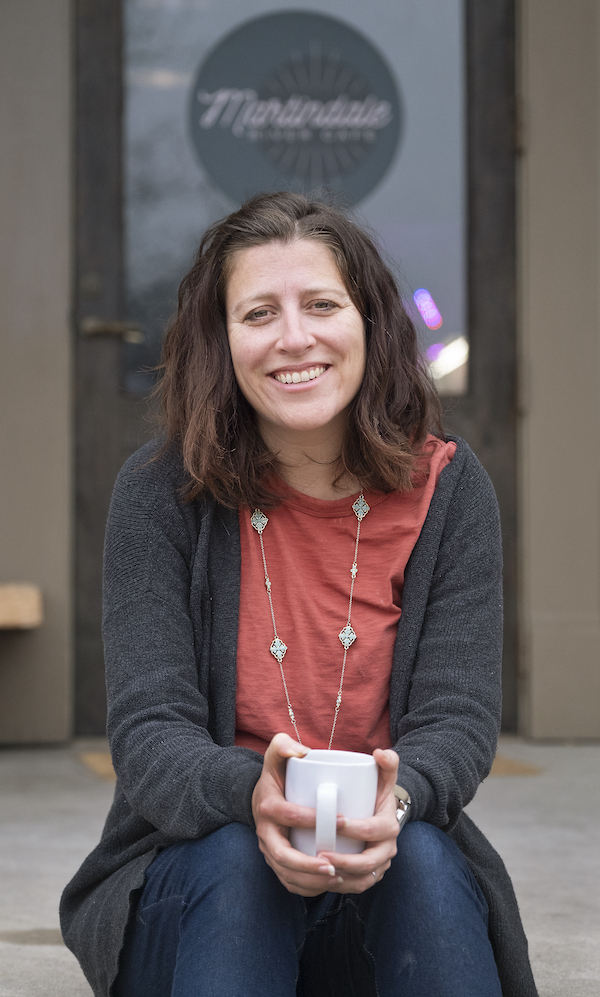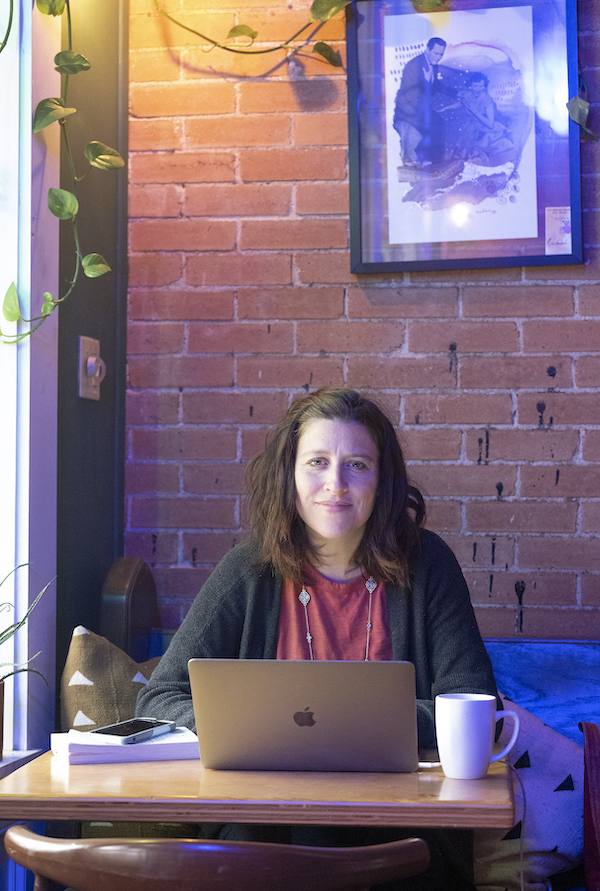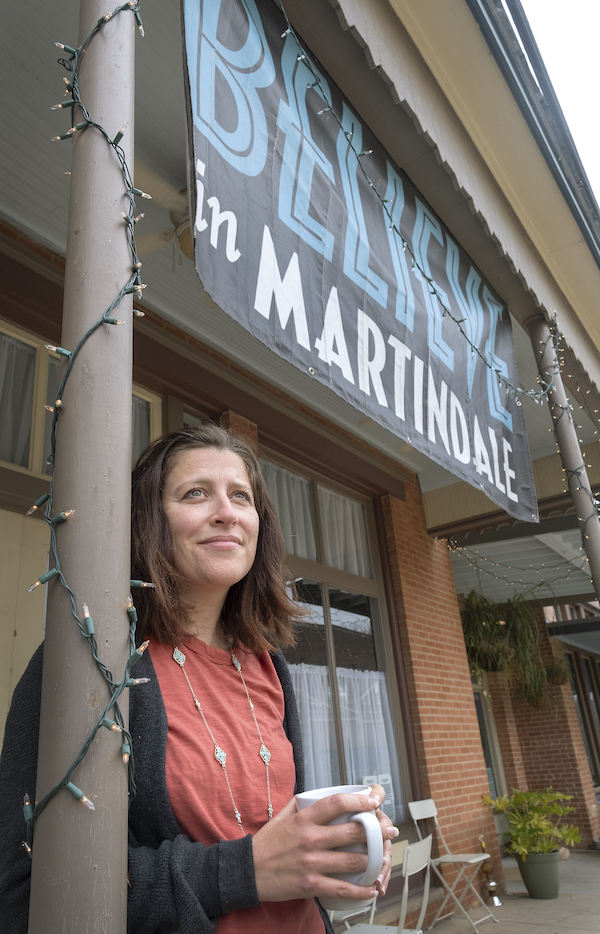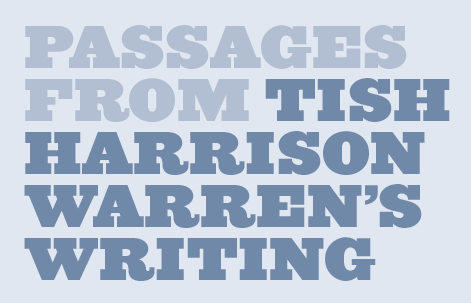TISH HARRISON WARREN is busier than ever these days in Caldwell County, Texas, where she spent her early childhood before moving to Austin and, eventually, after high school, heading to Wake Forest for college. She spent more than a decade as a campus minister with InterVarsity’s Graduate and Faculty Ministries and worked through various churches and nonprofits to help people living in poverty or suffering from addiction. With her husband, the Rev. Dr. Jonathan Warren Pagán (’02) — both are ordained in the Anglican Church in North America — she is raising two daughters, 11 and 9, and a son, 2. Pagán is assisting priest and interim director of family ministries, and she is writer-in-residence at Resurrection Anglican Church in South Austin.
Warren’s list of eclectic jobs, which she has described as “Mom, priest, campus minister, writer,” includes these work sites: “bookstore, coffee shop, organic grocery store, elementary school office and drug rehab center.” She goes on, “I’ve been on a film crew, taught English overseas, assisted in kids’ ballroom dancing classes, and nannied.” In summer 2021, she added a new role to her résumé — weekly newsletter writer sharing about faith and public discourse and private life for the opinion section of The New York Times.
The invitation came after Warren, 42, wrote two books, “Liturgy of the Ordinary: Sacred Practices in Everyday Life,” Christianity Today’s 2018 book of the year, and the Evangelical Christian Publishers Association’s 2022 Christian Book of the Year “Prayer in the Night: For Those Who Work or Watch or Weep.” (Warren points out that the InterVarsity Press editor on both was Cindy Bunch (’87); “I want to show her some love.”) Warren’s essays and articles have appeared in Christianity Today, Comment magazine and the Religion News Service. The new assignment brings her insights occasionally to the Times’ website home page and in print to more than 8 million subscribers, a global audience whose faith traditions (or lack thereof for some) can be wildly different from her own.
Maria Henson (’82) of Wake Forest Magazine spoke to her earlier this year about her life and her new role. The interview has been edited for length and clarity.

MH: Tell us about how you came to write for The New York Times.
THW: I would have never in a million years sought out this job for lots of reasons. First of all because it’s very difficult, and I tend to want things to be chill and not difficult. I was writing broadly. I’d already had two books out, and I was writing for Christianity Today — a monthly column — and then freelancing, and I had written for the Times twice. The head of the opinion section emailed me and asked if I would be willing to have a conversation about a project they were doing.
I told my husband, “This is going to be like they want my quote for a religion take, or this is going to change my life, this conversation.” … She had come across my writing, and they were wanting someone with a religious perspective. …
It was like a meteor in the sense that it just came out of nowhere and was unexpected.
I don’t know who walks around thinking The New York Times is interested in their take. Some of that is because I’m an Anglican priest, right? And I’m a female priest, but I’m a fairly-traditional-trying-to-be-somewhat-Orthodox female priest. It’s difficult to use this language because some people would consider me far left and some would consider me far right. But I certainly, I would say, have a more conservative or traditional religious conviction than your average New York Times reader. When I was deciding if I could take the job, I said I want to be able to write to a broad audience that believes very differently than me, that has no religious belief or different religious beliefs, different political opinions. I am only going to be able to write out of my own perspective as an Anglican priest who believes what I believe and is who I am.

MH: What have you learned in your first months of writing for the Times?
THW: I started at the Times in this weird season where we’re coming out of COVID, but we’re not. Some people feel like COVID is kind of over. Some people feel still afraid and concerned. And there’s a lot of polarization. I think people are really hurting. And I think that goes for people on both sides of the political aisle (and) for people of various races, genders and beliefs. There are a lot of hurting people.
And I think people are really, really wanting hope. People are thirsty for hope. They’re just starving for it. I mean absolutely famished for hope, for genuine consolation and comfort. Not superficial comfort. True, good, luminous hope.
One of the things I’ve learned is that I think to move forward, to rebuild social trust as a culture, we need a few things — to spend less time online and more time connecting with real people. I feel old saying that. … But what connects people with me, even people who are really different from me, ends up being stories from their life. It ends up being the people around them, the people who have impacted their life, neighbors, family members. We need to rebuild physical, daily interactions with people.
We also need really good thinkers thinking in public. We need people that have really different views, particularly views that don’t just parrot the left or parrot the right. …
They don’t entirely fit into kind of the red team or the blue team, who aren’t partisan and are thoughtful, who are trying to learn. In order to have that, we have to make space for people without being shouted down. We have to make space to let people be wrong in public.
I’m not against strong opinions, but I think that we hold those opinions and go, “Well, yeah, I could be wrong, or I might not understand fully, or I have to continue to learn from other folks in the midst of that.”
MH: I think as a society we are struggling with how to have difficult conversations across differences. You’ve written about that. What advice do you have?
THW: (She mentions a 2021 University of Virginia project that reported how of 2,012 people surveyed, significant percentages from both parties “somewhat agree” they favored blue and red states seceding from the union to form separate countries.) I mean that’s just shocking. So, it’s very difficult to reach across ideological differences right now. To be completely honest and a little vulnerable, it’s very difficult to be a writer in the public square because I get yelled at a lot. And I also get thoughtful engagement. Unfortunately, with the kind of rage machine that is social media, (it) exacerbates our rage more than when people are in person with one another. Our discourse devolves into accusations and recriminations out of our hurt. …
There was a time where we said, “We are going to achieve unity by saying we’re all basically the same.” Like we all kind of believe the same things, want the same things. It was a superficial and relativistic idea that we can kind of all get along because our differences aren’t very great. I think that’s not a helpful way to approach creating relationships over deep distance and rebuilding social trust. I think we have to start and say, “No, we really do sometimes see the world differently than other people. We really do have some different assumptions about what’s true and false, what’s good and not, what’s worth protecting and what’s not worth protecting.” …
I think that often what we lack, honestly, is just humility — the idea that we don’t actually have all the facts. We don’t actually understand the fullness of things. … The kind of academic word for this is epistemic humility. We’re humble about not just what we know but how we know what we know, right? I think that part of being a human is that we’re really limited.
And that doesn’t mean we can’t have strong opinions. I’m literally paid by The New York Times to have opinions and say them. … And that means I might not always be right. My opinions could sometimes be wrong or incomplete or just kind of dumb. … I’m not against strong opinions, but I think that we hold those opinions and go, “Well, yeah, I could be wrong, or I might not understand fully, or I have to continue to learn from other folks in the midst of that.”
MH: I’m curious about your upbringing.
THW: My parents had a profound sense of community. They were both kind of small-town kids with a strong sense of civic duty. They were the people who baked the casseroles on Wednesday night at church and headed up the chamber of commerce and manned the booth for the PTA and volunteered for Meals on Wheels. Honestly, as the mom of three kids now, I’m like, I don’t understand how they had that much time or energy, but they did. …
My father was a banker for a while. My mother was a real estate agent and sort of built her own company, and then my dad joined it, and they ran it together. … I spent more Sundays than I can remember going to church and then going to open houses and being incredibly bored while my parents did open houses for a long time.
MH: And handing out chocolate chip cookies?
THW: Yes. I just brought a book and sat in the back.
MH: Tell me about how Wake Forest came across your radar, because I imagine you had a lot of people saying you would go to the University of Texas or Texas A&M or Rice.
THW: UT, A&M or Baylor. Everyone in my whole world was at one of those schools. Or Texas State, which is now Southwest. So, it’s weird and crazy that I ended up at Wake Forest. My friend Robert (Hamilton ’98) was four years ahead of me. He went to this place, Wake Forest. I don’t know why I became so intrigued by it. I asked for a brochure, and they sent me a brochure.
I think I had some questions, some theological questions, but also questions of identity and who I was that I didn’t know how to explore without just getting away from everyone I ever met. Which, honestly, looking back, I don’t think was the healthiest way to respond to some of that, but that was part of it. I also was just craving adventure. I wanted to go to a school with four seasons. … I really wanted a school where most people lived on campus because something about the community life was appealing to me.

MH: I thought you were probably an English major, but you were a communication major.
THW: I took this class on race, religion and American film (First Year Seminar: Racial Identity and Religion in American Film), team-taught by (Professor of Communication) Mary Dalton (’83) and Eric Watts. I loved it, so I ended up majoring in (communication). … I ended up taking a lot of classes with Mary and a lot of classes on race and religion whenever I could. … I would say if there’s anything I looked at in college, it was how we, as a culture, discuss things and particularly discuss important and controversial issues. And that question still is a shaping, driving question of my life. …
MH: What would you want to say that I didn’t bring up?
THW: You don’t have to include this — you don’t — but I’m really grateful Wake Forest was a place where I was exposed to the idea of voices around a table. And I’m still pretty idealistic about the university as a place where people can strongly disagree and still hold space for each other and for debate and for getting at critical issues. … I hope, as I think our culture is getting less tolerant of hearing other ideas, the universities will stay places where you have a really broad — even shocking — swath of ideas that are out there. And where friendship is modeled between people that have those ideas. That is something I experienced at Wake.

“IN COLLEGE, I LIKED RAMEN NOODLES. The main reason I liked them, besides the fact that they were awesomely terrible and cheap, was because we didn’t have a kitchen in our dorm room. All our meals had to come from ‘The Pit,’ the charming nickname of our cafeteria. But my suitemate, Jen, had a camp stove and we had a sink so, by the magic of Maruchan ramen, we could make lunch in our dorm room. We got into the routine of doing this together almost daily, sitting on Jen’s futon, eating our instant ramen. There was hardly any nourishment in it, besides the good conversation with Jen, but it left us feeling full enough and we didn’t have to slog across campus. Plus, once you start eating ramen, it’s hard to stop. It’s addictive.
“Habits shape our desires. I desired ramen noodles more than good, nourishing food because, over time, I had taught myself to crave certain things and not others. In the same way I am either formed by the practices of the church into a worshiper who can receive all of life as a gift, or I am formed, inevitably, as a mere consumer, even a consumer of spirituality. The contemporary church can, at times, market a kind of ‘ramen noodle’ spirituality. Faith becomes a consumer product — it asks little of us, affirms our values, and promises to meet our needs, but in the end it’s just a quick fix that leaves us glutted and malnourished.”
—Excerpted from “Liturgy of the Ordinary: Sacred Practices in Everyday Life”
“MY GREATEST EXAMPLE of the magic of trivial conversation came from my late father. He was named ‘funniest-friendliest person’ by the local newspaper in the small Texas county I was born in. Really. That’s a real award. My dad had friends across the political spectrum. He saw a person’s ability to find a moment of levity — a laugh about the Aggie vs. Longhorn rivalry — as more important than the person’s political affiliation. He saw the demonization of your political opponents as a character flaw, not a mark of purity or passion.
It wasn’t that he didn’t think politics mattered — he lectured me on the importance of voting. He simply thought that cordiality and the civil trust it engenders mattered more. Granted, he’d never use the words “cordiality” or “civil trust.” He’d call it not taking yourself too seriously and being a good neighbor. As a kid, I watched him perform some kind of daily alchemy, building bridges with simple conversations, crossing racial, political and ideological lines while checking his mail or depositing a check. He called forth a mutual humanity between people. It astonished me then and now.”
—Excerpted from “How Americans Can Learn to Live Together Again” in The New York Times, Oct. 24, 2021


